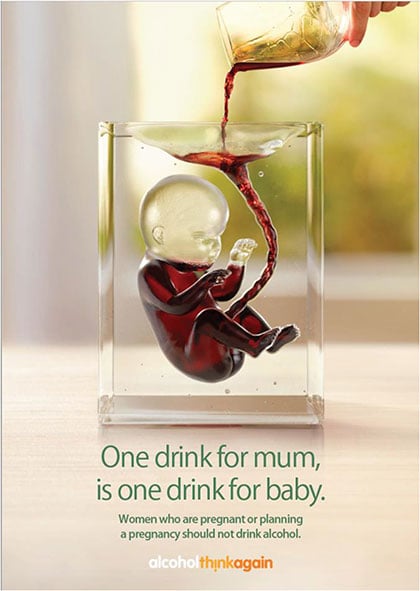One Drink campaign proves efficacy in supporting the reduction of alcohol use in pregnancy
(Estimated reading time: three minutes)
The ‘One Drink’ campaign aims to increase awareness that there is no safe amount or time to drink alcohol during pregnancy. Evaluation outcomes have been published in the Australian and New Zealand Journal of Public Health proving the advertising campaign created significant awareness among pregnant women, those planning a pregnancy – including men and women – and the broader community of the risks associated with drinking alcohol during pregnancy.
It is recommended that women who are pregnant or planning a pregnancy should not drink alcohol because no safe level of alcohol consumption during pregnancy has been identified. Recommendations are based on the latest Australian research and are included in the National Health & Medical Research Council (NHMRC) Australian guidelines to reduce health risks from drinking alcohol, specifically, Guideline 3: Women who are pregnant or breastfeeding, which says:
To prevent harm from alcohol to their unborn child, women who are pregnant or planning a pregnancy should not drink alcohol.
Program Director Professor Simone Pettigrew from The George Institute for Global Health explains the effectiveness and results from the 'One Drink' campaign.
About the campaign
The ‘One Drink’ campaign features a video depicting a glass mould of a foetus being filled with red wine using a glass placenta. The female voiceover states:
“To you, it’s just one drink. But because your placenta does not protect your baby from alcohol, any amount you drink, your baby drinks, which can lead to lifelong physical, mental, and behavioural disabilities. Women who are pregnant or planning a pregnancy should not drink alcohol”.
Along with the video, the campaign also featured across print publications, showing the same glass mould of a foetus being filled with red wine via a glass placenta, with the main heading ‘One drink for mum, is one drink for baby’ and a subheading of ‘women who are pregnant or planning a pregnancy should not drink alcohol.’

The campaign utilised not only TV and print but many components of the marketing mix including outdoor media, posters in healthcare centres, radio, digital and social media.
See the full campaign components or view the 30 second video.
The study
Professor Simone Pettigrew from The George Institute for Global Health is the lead author on this paper and explains the valuable outcomes from this mass media campaign. The study aimed to assess the effectiveness of communicating the potential harms associated with consuming even small amounts of alcohol in pregnancy. In addition, there were efforts to evaluate change in the intentions to abstain during pregnancy after campaign exposure.
Evaluation outcomes
Around 400 Western Australians were surveyed about their alcohol-related beliefs and behaviours, their exposure to the One Drink campaign, and whether the campaign had changed their lifestyle choices.
Findings demonstrated:
- 76 per cent of survey participants had seen the campaign
- 95 per cent of women reported intending to abstain from drinking when pregnant
- both males and females were more likely to agree that no level of alcohol intake during pregnancy was safe at the end of the campaign period.
The research also highlights the broader issue of confusing messaging and advice about drinking alcohol during pregnancy.
More information
To find out more, you can read the publication or view resources about alcohol and pregnancy on the FASD Hub.
Browse other research spotlights.